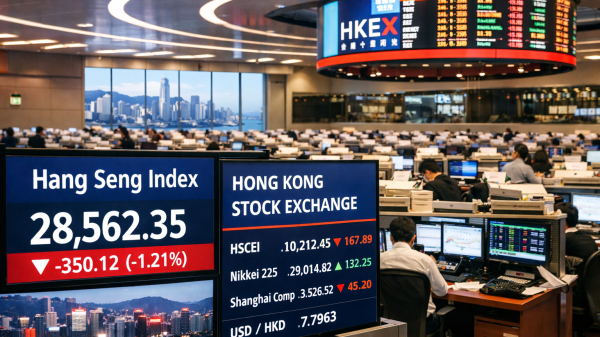Chinese stocks experienced early fluctuations and dipped as investors grow increasingly impatient with the pace of stimulus measures from the central government.
The CSI 300 Index, which tracks the largest companies listed in Shanghai and Shenzhen, was down 0.2% by midday after initially plunging as much as 1.3% during morning trading.
This recent decline marks a total fall of over 10% since reaching a peak on October 8. Meanwhile, Chinese shares listed in Hong Kong managed a modest rebound, with the Hang Seng Index rising 0.7%.
Roller-coaster market driven by stimulus optimism fades
The market’s recent fluctuations highlight the volatility in Chinese equities since late September, when a wave of central bank stimulus measures briefly ignited optimism among investors.
However, that initial enthusiasm has now quickly cooled, as Beijing has yet to provide further details on its fiscal spending plans.
This uncertainty is fostering doubt about whether Chinese authorities are prepared to deploy more aggressive measures to stabilize the economy and support stock markets.
“The historic surge in momentum at the end of September was, of course, unsustainable,” said Marvin Chen, strategist at Bloomberg Intelligence.
Given how fast markets rose, they can fall just as quickly. But overall policy actions are moving in the right direction, and when the dust settles, China equities may still trade in a higher range than before.”
Although a 10% decline might typically signal a technical correction for the CSI 300 Index, the extreme volatility in Chinese markets lately has diminished the significance of such milestones.
After soaring more than 30% over three weeks from mid-September, the index has now lost momentum, reflecting investors’ mixed sentiments about whether the rally has peaked or if further gains are still possible.
Fund manager survey shows divided outlook for Chinese stocks
A recent survey conducted by BofA Securities between October 4 and 10 found that fund managers remain divided over the prospects for Chinese offshore stocks.
Half of the respondents forecast a 10% upside potential for the next six months, while 33% anticipated gains of 10% to 20%.
Nearly a third of the respondents reported increasing their exposure to the market amid signs of easing, a significant increase from just 8% in the previous month.
However, despite this optimism, three-quarters of the fund managers surveyed believe the market is undergoing a “structural de-rating,” a sign of underlying concerns about long-term growth prospects.
Property sector becomes key focus amid economic uncertainty
All eyes are now on an upcoming press briefing by China’s Housing Minister Ni Hong, set for Thursday, where the government is expected to unveil further measures to support the struggling property sector and boost economic growth.
Investors are keen to see how the government plans to address the challenges facing the real estate industry, which has been one of the main drivers of China’s economic slowdown.
Ahead of the briefing, Chinese property stocks saw a strong rally, with a Bloomberg Intelligence index of developer shares surging as much as 8.3%.
However, this optimism may prove short-lived if the announcements fall short of investor expectations.
Vey-Sern Ling, managing director at Union Bancaire Privee, urged caution, stating that recent press briefings by senior economic officials have been underwhelming.
“The last two pressers by the National Development and Reform Commission and the Ministry of Finance have been disappointing, so there should be no reason to lift hopes for the briefing tomorrow,” Ling said.
Impact on commodities and broader markets
Beyond the stock market, China’s slowdown has also weighed heavily on commodities, with iron ore futures reflecting the uncertainty in the country’s industrial sector.
Iron ore, a key component in steel production, traded just below $106 a ton in Singapore after swinging between gains and losses throughout the trading day.
The steel-making staple has been hit hard by reduced demand from Chinese mills, which have scaled back production due to the country’s weaker economic performance.
As Chinese markets continue to navigate volatility and uncertainty, investors are closely watching Beijing’s next moves, particularly in regard to the property sector.
The government’s ability to implement effective stimulus measures will be crucial in determining whether markets can regain their footing or face further declines.
The post China’s CSI 300 Index faces volatility as investor concern over stimulus grows appeared first on Invezz




































